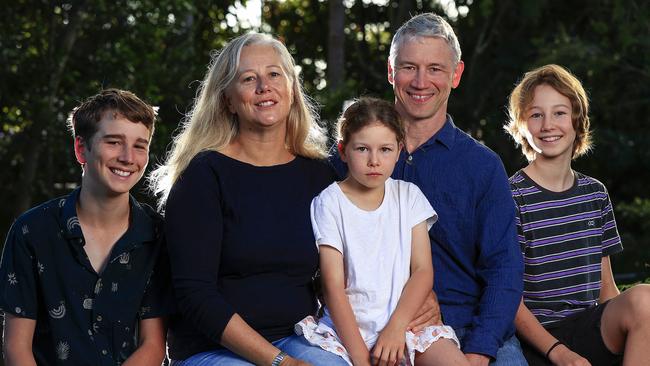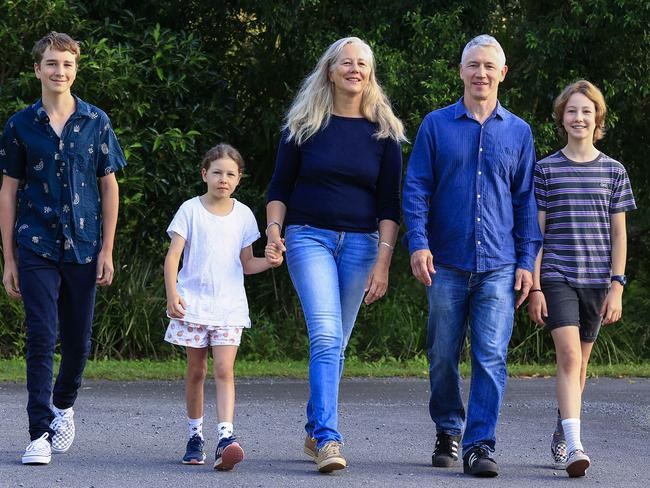Ahead of the curve: The parents who banned their kids from social media
A couple who have refused to allow their children access to mobile phones and social media for a decade have likened their dangers and risk of addiction to smoking.

Lifestyle
Don't miss out on the headlines from Lifestyle. Followed categories will be added to My News.
A couple who have refused to allow their children access to mobile phones and social media for a decade have likened their dangers and risk of addiction to smoking.
Anthea Dare, 51 and Byron Vallentine, 50, are unapologetic about the hard line stance with their three children – Taran, 15, Kaiya, 13, and Naomi, 9 – claiming it’s been short-term pain for long-term gain.
“I think smartphones and social media are addictive and dangerous, like cigarettes, and you’re not allowed to try those until you’re 18, so I feel like we need the same sort of focus on recognising devices and social media for what they are,” Mr Vallentine said.
When Taran was aged three the couple gave him an iPad after other parents spruiked the benefits of educational apps and the couple thought it could be used to complement their parenting along with other activities.
But after seeing other children and their son become drawn into the devices and engaging less with each other, when Taran was about six, the couple committed to banning their kids from all devices and social media, except television.
“We never thought of it as being dangerous or causing addiction. That didn’t even cross my mind,” Ms Dare said.
“Even giving him 10 minutes a day on the iPad there was a fight to get it off him, and then the moods and the way we saw him responding when he did play games and stuff on there, he would get grumpy and disconnected.
“So we both agreed to zero access.”
Ms Dare said during Covid-19 they allowed Taran – then 12 – to take up video gaming as a way of staying connected with friends during lockdowns.
But his experience and own concerns around gaming led the couple to enrol him in the very first Gold Coast-based Kokoda Youth Foundation’s digital detox program – an early intervention program for 12-14 year olds showing signs of digital dependence.
“It was pretty obvious he wasn’t addicted but he said it was quite valuable because there was a whole cross section of kids, some who really were addicted to their phones going into high school,” Ms Dare said.
“He got to see what other kids are going through, particularly the girls on the social media side of things.
“It actually had a big impact on Taran because he actually came back feeling really good about not having a phone.
“I think it just made him realise how bad it could be and it kind of made him go ‘I don’t want to be like that’.
“He got a lot of positive reinforcement … and it solidified to him and others that he was doing the right thing by being strict.”
Mr Vallentine said the camp underscored the importance of talking to children about how devices and social media can become addictive, how they are designed to be addictive, what addiction looks like and the negative consequences.
“No kid wants to be addicted. When they are shown the impact that it has they want to change,” he said.

The parents say now their daughter Kaiya was in high school, pressure had mounted on them to reconsider their stance after her peers were given phones by parents.
Ms Dare said despite a phone ban at school, students were circumventing rules at lunch breaks to watch YouTube, scroll on and make TikTok content instead of playing together as they had in primary school.
“Kaiya had never asked for a phone before because she knew she wouldn’t get one but she said ‘I need a phone now because no one will talk to me at lunch’,’ Ms Dare said.
“She said I’m being left out and that friends that she played with felt sorry for her because she didn’t have an Instagram account and ‘they can’t contact me’ because she doesn’t have a phone.”
She said another mother had recently spoken to her about caving in to the same pressure.
“She got her daughter a phone thinking that meant the girl wouldn’t be left out of things anymore,” she said.
“But all that happened was the girl continued to be left out but now she could sit in her room and see every event and every single thing she was being left out of and so she’s now gone into much more of a state of unhappiness.
“It was heartbreaking and I just felt relieved that we had been so strong on it.”
The couple supported the campaign around raising the age of access to social media to 16, likening it to getting a learner driver’s licence at the same age.
“I think there are probably a lot of parents out there that perhaps aren’t aware of the dangers and are unaware that something can be done,” Mr Vallentine said.
“And I think something like ‘you can’t use social media until you’re 16’ could be a real catalyst for the reconsideration of everything.”
The couple say legislative change could also spark more parental pacts on restricting access and addressing children’s fear of missing out because it would be a national approach.
“I think it will definitely help,” she said.
“You just want continuous reinforcement of the message in a variety of different forms so if there is legislation, education in schools, conversations with other parents and constant messaging I think is how we can achieve changes.”
The couple say restricting access to devices and social media is not easy and families needed to work to offer alternative activities to reduce use, which was often more time consuming.
“At the end of the day it’s ripping off a band aid … particularly if it’s an addiction,” Ms Dare said.
“It’s really hard because you need to fill in the time that they would be spending on their devices and that actually puts more pressure on parents.
“You might have to sign them up to activities or carve out time to spend with them.
“If you’re using devices when the kids are younger … you will certainly be doing your time during those teenage years so we would strongly say it’s easier to have that short term pain when they are younger … to then not have to go through all the issues that are so hard to undo when they are older.”
Mr Vallentine said the subsequent explosion in social media use and known links to poor mental health had only reaffirmed their beliefs but parents wouldn’t be successful helping their own children without leading by example.
“If you want to solve your kid’s problem, you kind of need to address your own use as well.
You can’t be telling them to get off their phone when you know you’re then going to spend hours sitting on your own phone,” he said.




